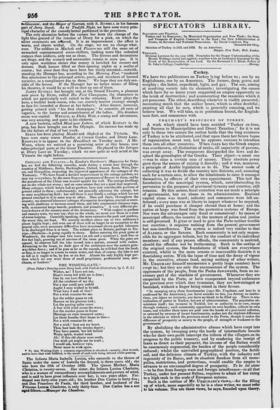COTTAGES AND London's Gardener's Magazine for Octo- ber, we find
the following remarks, made during a recent tour through the counties of Middlesex, Berks, Buckingham, Oxford, Sussex, Kent, Wilts, Dor- set, and Hampshire, respecting the improved appearance of the cottages of the Yeomanry. " We have found a decided improvement in the cottage gardens, we may say everywhere, by the more frequent appearance of Rowers in them, and by the prevalence of the China rose trained against the wall. The cottage dwellings are on the whole not worse ; and on some estates they are a good deal improved. Many cottages, which before had no gardens, have now considerable portions of ground added to them; unfortunately, not generally adjoining the cottage, but in some neighbouring field ; but still there is nowhardly a cottage which has not ground attached to it in some way or other. Here and there, throughout the country, we observed labourers' cottages of a superior description, erected or erect- ing with platforms or terraces round them, and lofty ornamental chimney-tops, with ornamental barge-boards, pendants, and pinnacles." A very different pic- ture is drawn of the country seats of the Aristocracy. " With respect to gardens and country seats, we may say, that on the whole, we never saw them in a state of worse keeping. Generally speaking, the more extensive the park and gardens, the worse they are kept. We scarcely recollect above one or two noblemen's places highly kept ; and even one of these will no longer be an exception to the general rule, since pecuniary difficulties have occasioned eleven garden labourers to be discharged from it at once. The noblest place in Britain, perhaps in Eu- raPpe—Blenheim—is going rapidly to decay. Before entering the great gates at Woodstock, the stranger sees two trees (an ash and a sycamore), each tour or five feet high, growing out of crevices of the stone piers. When the gates are opened, he observes half the lake turned into a morass, covered with rushes. Advancing to the house, he finds part of the architrave over the eastern gate- way fallen down ; and if he goes as far as the cascade, he will find that the head, er dam, is no longer in a state to retain water, and that, of course, the lake is not so full as it ought to be, by five or six feet. Almost the only highly kept gar- dens which we saw were those of small proprietors, professional men, mer- clients, or bankers."
THE WISHING-GATE."
[From Fisher's Drawing-room Scrap book, with Poetical Illustrations, by L. E. L.)
Wishes, no! I have not one, Hope's sweet toil with me is done; One by one have flitted by All the rainbows of my sky. Not a star could now unfold Aught I once wished to be told. What have I seek of thee ?
Not a wish remains for me.
Let the soldier pause to ask Honour on his glorious task ; Let the parting sailor crave A free wild wind across the wave ; Let the maiden pause to frame Blessings on some treasured name;
Let them breathe their hopes in thee—
Not a wish remains for me.
Not a wish ! beat not my heart, Thou hast bade thy dreams depart ; They have passed, but left behind Weary spirit, wasted mind. AM if this old charm were sooth, One wish yet might tax its truth ; I would ask, however vain, Never more to wish. again.
• To this Wishing-Gate a common superstition is attached,—namely. that to wish, and to have that wish fulfilled, is the result of such wish being uttered while passing.


















 Previous page
Previous page